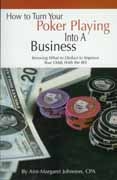
Tax Guide for Gamblers

How to Turn Your Poker Playing Into a Business
Tax Questions For Gamblers Answered in Two New Books
Gamblers with tax questions will find help in two particular titles -- one very new, another a respected reference that the pros have been using for years – arriving just in time to help.
The Howard Schwartz, the "librarian for gamblers," is the marketing director for Gambler's Book Club in Las Vegas, a position he has held since 1979. Author of hundreds of articles on gambling, his weekly book reviews appear in numerous publications throughout the gaming industry. Howard's website is www.gamblersbook.com two books are How To Turn Poker Playing Into a Business (Knowing What to Deduct to Improve Your Odds With the IRS) by Ann-Margaret Johnston (122 pages, paperbound, $19.95) and The Tax Guide for Gamblers by Roger and Yolanda Roche -- Sixth Edition (64 pages, paperbound, $29.95). Both are excellent references and both are available at Gambler's Book Shop in Las Vegas.
Howard Schwartz, the "librarian for gamblers," is the marketing director for Gambler's Book Club in Las Vegas, a position he has held since 1979. Author of hundreds of articles on gambling, his weekly book reviews appear in numerous publications throughout the gaming industry. Howard's website is www.gamblersbook.com two books are How To Turn Poker Playing Into a Business (Knowing What to Deduct to Improve Your Odds With the IRS) by Ann-Margaret Johnston (122 pages, paperbound, $19.95) and The Tax Guide for Gamblers by Roger and Yolanda Roche -- Sixth Edition (64 pages, paperbound, $29.95). Both are excellent references and both are available at Gambler's Book Shop in Las Vegas.
The book by Johnston is newer, with a 2005 copyright. Here the author’s primary focus is on the game of poker, a good approach because that is her game of preference and because that does seem to be the hottest game of the tax year. It contains 13 chapters, sample tax forms and how to complete them, plus a glossary of terms. It clearly concentrates on the one game which for millions has caught on light wildfire due to its popularity on television, online and toward tournament play, nationally and internationally, a phenomenon that means a lot of players could be in need of serious help.
The author, a certified public accountant, understands what the lifestyle of professional players entails -- with travel, expenses, tournament fees and something players often forget -- record-keeping, documentation, food, legal fees and on the road expenses among other items. Explaining and proving to the Internal Revenue Service how much you won, lost and spent being a professional isn't always easy for the novice to handle, so Ms. Johnston takes you through the process with examples, a virtual checklist of items to consider and what your tax return should look like.
"The IRS looks to see if you devote most of your personal time and effort to the activity (poker for example). Also, if you leave one occupation to devote most of your time and energy to the activity, it provides evidence that you are doing this for profit. The number of hours you spend and the result you achieve is a good indicator," she advises.
She adds: "The fact that you depend on this activity to be successful is important."
The oft-asked question: "Can I deduct my losses from my winnings?" is answered clearly and with examples, and she remind potential pros "...that gambling is in a field that tends to be more scrutinized than other professions" and that the IRS ... “holds professional gamblers to a very high standard"...and "with more skepticism so it is important to be very cautious in your determination of a business or a hobby."
The book is full of do's and don't and warnings, with examples of mistakes would-be pros make in trying to fool the IRS or hide winnings (income). For the price, a most valuable book at the right price at the right time of the year--before you must file.
The Tax Guide For Gamblers by the Roche, last revised in 2004, has always been a valuable resource and continues to be. Divided into four sections, it is perfect for casual players, novices, recreational players who not only play poker, but other games like race and sports betting; bingo, slots, table games, keno and who may also play on the Internet.
There's even a small, but vital discussion about foreign tourists and withholding. The book has a small section for winners of poker tournaments and guidance on what to expect if you get comped.
The chapter titled The Rules for Professional Players is vital, for it discusses the tax benefits of being a professional; what proposition players (in poker) must do; and a short discussion of whether it's better to be a recreational player or a professional.
One chapter outlines the origins and structure of tax law and from page 34 on, sample forms you may need or be required to complete are there for you to read clearly.
If you're worried that buying both books might be overkill, don't. If you're a pro, or someone who won big in 2005, get them both because intelligent tax preparation creates peace of mind, confidence and helps eliminate stress and worry. The books will come in handy in future years and in a variety of situations. If you're a professional, they should also be deductible as a business expense.

